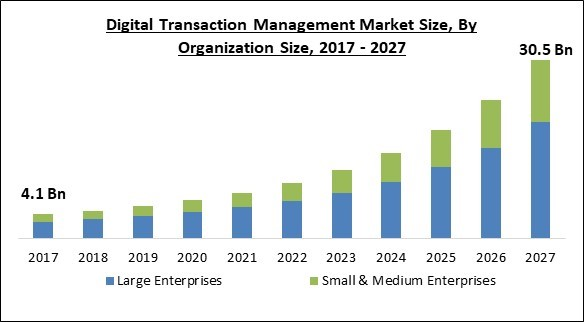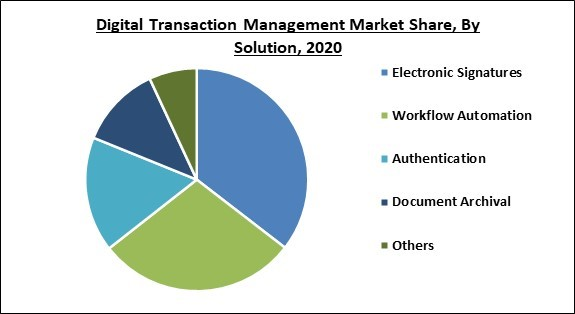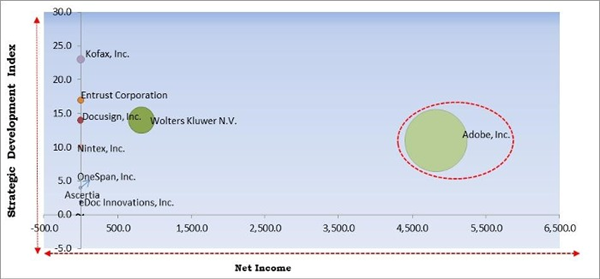Digital Transaction Management (DTM) is the process of converting paper-based document procedures to totally digital ones so that transaction processes may be executed digitally. DTM include document transfer, eSignatures, certification, data and form integration and administration, as well as a number of meta-processes centred on administering electronic transactions and the papers that accompany them.
DTM usage is accelerating, and it is likely to consume a significant portion of paper documents in the near future. To boost income and profitability, most businesses are turning to digital platforms. Salesforce, for example, used digital transaction management and saw a USD 20 per-document savings and a 60 percent decrease in response times. The firm also used electronic signatures in their sales process, which reduced transaction closing time from an average of two days to about 90% of deals completing in one day and 71% of deals concluding in one hour.
The usage of cloud-based solutions is also increasing, that will have a favourable influence on the digital transaction management market growth. Workflows must be managed in some way by both small and large enterprises. Employees and management may be on multiple systems that make significant transfers, making interdepartmental and cross-agency processes difficult. The digital transaction management process will be more seamless and cost-effective if a cloud-based solution enables any team member to access the documents.
COVID-19 Impact Analysis
COVID-19 pandemic outbreak has originally had a beneficial influence on the market, owing to the growth in remote working and the expanding digital transformation of enterprises. Over the projection period, the breakout of the COVID-19 pandemic is projected to promote the use of digital transaction management systems. Businesses are looking for methods of doing business that are smooth and efficient and can be performed from anywhere. Businesses all around the world are putting a lot of effort towards paperless approvals for both financed transactions and guarantee issuances. As a result, DTM solutions are projected to acquire momentum across a wide range of sectors and verticals. Electronic signatures are becoming more widely accepted as part of corporate transactions, which bodes well for industry expansion.
Market Growth Factors:
Rising Adoption of Mobile POS
The potential of the smartphone to accept transactions on the spot has been fully exploited by mobile point of sale. mPOS is a technology that allows all businesses to get rid of their in-store and brick-and-mortar transactions. As transactions are encrypted and card details is not saved on the mPOS device, liability is limited, reducing the risk of data breaches and making compliance easier and faster. Biometrics, such as fingerprint and face recognition, may be used with mPOS to verify customer credentials and threat intelligence throughout transactions, giving an extra layer of protection to digital transactions. Staff may view previous transactions, web browsing history, loyalty points, and other information that helps them understand the customer's needs using mPOS. These features have improved not just consumer happiness, but also employee performance.
Cost and time reductions enhance the efficiency and profitability of the organizations
They require an efficient system for handling digital transactions and keeping operations on schedule, whether they're onboarding new staff, issuing electronic purchase orders, providing financial records such as credit reports and payroll, or exchanging marketing content with the worldwide team. Business process simplification is a fundamental benefit of handling documents and related tasks through digital channels. You may save operating expenses, free up staff time to focus on more essential bottom-line-oriented company duties, and accomplish a faster time-to-revenue cycle by automating regular document-related operations like contracts and accounting functions.
Market Restraining Factors
Digital Transaction Management has a perception of having low level of trust
Despite the fact that the Digital Transaction Management business has had tremendous growth over the years, various risks may hinder its advancement. When it comes to money, one of the most significant restrictions that may confront the DTM industry is digital fraudulence and cyber threats. Malware dangers are increasing, jeopardising network and system security, posing a danger to digital transactions. As a result, extra protection in digital transactions is constantly required. Digital Transaction Management cannot be depended on, despite the fact that almost all systems provide two-factor authentication and enhanced protection. The market is expected to be hampered in the projected term by a lack of trust in Digital Transaction Management.
Component Outlook
Based on Component, the market is segmented into Hardware, Software and Services. Over the projected period, the software category is expected to grow at the quickest rate. The increased need for different software, like Contract Lifecycle Management (CLM) software, which may assist in managing digital transactions, can be related to the segment's rise. Businesses may use digital transaction management software to capture legally acceptable electronic signatures, track and manage the flow of documents among contractual parties, and secure document-based transactions and data storage. Digital transaction management systems with cloud-based features can help customers manage their business operations more effectively.
Vertical Outlook
Based on Vertical, the market is segmented into BFSI, IT & Telecom, Government, Retail, Healthcare, Real Estate, Utilities and others. Over the projected period, the government segment is expected to grow at the fast rate. As part of the digital governance efforts being pursued by many governments throughout the world, government agencies are anticipated to effortlessly embrace digital transaction management technologies. Governments have discovered that incorporating these technologies into their operations could provide advanced algorithms and an enhanced security for properly storing transaction records and ensuring efficient and appropriate governance. As a result, various governments throughout the world are pursuing suppliers to build digital transaction management systems for them.
Organization Size Outlook
Based on Organization Size, the market is segmented into Large Enterprises and Small & Medium Enterprises. In 2021, the large enterprise sector dominated the market. Large businesses must continue to organise transaction workflows and ensure efficient and cost-effective business operations. As a result, major companies are more likely to use digital transaction management systems to handle their transactions and respective documentation efficiently. Large businesses use digital transaction management systems to accept timestamped updates, provide proper authentication, and cooperate with reviewers, all of which helps to speed up the whole business lifecycle.
Solution Outlook
Based on Solution, the market is segmented into Electronic Signatures, Workflow Automation, Authentication, Document Archival and Others. Over the projected period, the workflow automation category is expected to grow at the quickest rate. Workflow automation saves time and money for organisations while also preventing mistakes in the procedures. Document and transaction errors might result in significant financial losses. Specifying criteria and rules as part of process automation systems, on the other hand, can assist firms in avoiding such blunders. As a result, businesses are increasingly choosing for workflow automation, which is likely to boost segment growth throughout the projection period.
Regional Outlook
Based on Regions, the market is segmented into North America, Europe, Asia Pacific, and Latin America, Middle East & Africa. In 2021, North America led the worldwide market. Several prominent industry incumbents, as well as new start-ups, provide digital transaction management solutions in North America. Furthermore, the region is noted for being one of the first to implement cutting-edge digital transaction management technologies. As a result of these reasons, the North American regional market now accounts for a significant portion of the worldwide market. Over the projection period, Asia Pacific is predicted to be the fastest-growing regional market.
Cardinal Matrix - Digital Transaction Management Market Competition Analysis
The major strategies followed by the market participants are Acquisitions. Based on the Analysis presented in the Cardinal matrix; Adobe, Inc. is the forerunners in the Digital Transaction Management Market. Companies such as Docusign, Inc., Wolters Kluwer N.V., Kofax, Inc. are some of the key innovators in the Market.
The market research report covers the analysis of key stake holders of the market. Key companies profiled in the report include Ascertia, DocuFirst, eDoc Innovations, Inc., Docusign, Inc., OneSpan, Inc., Entrust Corporation, Kofax, Inc., Nintex, Inc., Wolters Kluwer N.V., and Adobe, Inc.
Recent Strategies Deployed in Digital Transaction Management Market
Partnerships, Collaborations and Agreements:
- Feb-2022: OneSpan signed a partnership agreement with Smart Communications, a leading technology company aimed to support businesses engaged in more meaningful customer conversations. Together, the companies focused on building operational efficiencies and enhancing the customer experience by integrating the company’s e-signature product, OneSpan Sign, into the Smart Communications platform.
- Jan-2022: Wolters Kluwer Compliance Solutions teamed up with Floify, a subsidiary of Porch Group and leading point-of-sale solution in the mortgage industry. Under this collaboration, Floify customers is expected to gain the ability of digital e-closing that enables them a digital signature facility by combining the company’s eOriginal’s digital promissory note (eNote) technology into the latter company, Floify’s loan processing system through a hybrid e-closing process.
- Jan-2022: Nintex came into a partnership with Insuresoft, a leader in providing mission-critical core insurance software for property and casualty insurers. The partnership aimed to introduce integrated eSignatures from the company’s AssureSign into Insuresoft's Diamond Platform for accelerating the digital transformation of the insurance industry.
- Nov-2021: Adobe came into a partnership with IBM, an America-based multinational technology corporation. Together, the companies focused to strengthen the digital economy with intelligent document transformation through combining the expertise of the company’s Document Cloud’s digital document processing solutions and skillfulness in digital strategy as well as IBM iX’s human-centered design and document automation.
- Oct-2021: Entrust came into a partnership with Veritran, a global leader in providing a Low-Code Platform. Following the partnership, the company aimed to support banks to compete in a digital-first world with a flawless and protected customer authentication and issuance experience by adding Veritran global expertise in developing mobile banking solutions through the company’s Low-Code platform.
- Sep-2021: OneSpan teamed up with NewB, a Belgium-based challenger bank. The collaboration aimed to enable the banks and other financial institutions to adopt changes quickly in the market as well as manage security and other regulatory compliance needs by leveraging cloud services.
- Aug-2021: Wolters Kluwer partnered with ICE Mortgage TechnologyTM, a division of Intercontinental Exchange. Through this partnership, the company aimed to offer a comprehensive digital lending workflow, from origination to closing to secondary market delivery by using the ICE Mortgage Technology Platform and the Mortgage Electronic Registration System (MERS) eRegistry with the company’s ClosingCenter.
- Jun-2021: Wolters Kluwer Compliance Solutions joined hands with MK Decision, a San Diego-based company. Together, the companies aimed to provide a digital account opening capability to U.S. deposit institutions by leveraging the latter company, MK Decision’s digital account opening platform with the company’s dynamic, compliant Expere Deposit electronic disclosure documents.
- Mar-2021: Adobe came into a partnership with government agencies of all 50 states of the U.S. Through this partnership, the company aimed to strengthen its digital modernization through Adobe Document Cloud and Adobe Experience Cloud. Moreover, the government authorities is expected to renovate their online presence, creating their websites and apps to protect the personalized content, update in real-time as well as make intuitive forms that work on any device by leveraging Adobe Experience Cloud.
Acquisitions and Mergers:
- Sep-2021: Entrust entered into an agreement to acquire Antelop Solutions, a financial technology company. Through this acquisition, the company aimed to make it simple for banks to add secured fully digital credit and debit cards in their mobile wallets.
- Aug-2021: Kofax completed the acquisition of Printix.net, a provider of cloud-based print management systems. Following the acquisition, the company aimed to improve its intelligent automation platform, raise its customer and partner ecosystem as well as strengthen its foothold in the high-growth, cloud-based SaaS print management software market.
- Apr-2021: Entrust completed the acquisition of WorldReach Software, a Canada-based company that supports travel services providers and governments to make the travel experience seamless by the digital transformation of the secured identification process for immigration and wider management programs. Through this acquisition, the company supports the organization to strengthen government and travel service experiences across secure digital identities. Moreover, the acquisition is expected to position Entrust at the forefront of digital transformation in travel and citizen identification services.
- Jun-2021: Kofax completed the acquisition of PSIGEN Software, a provider of workflow automation, document capture, and content management software and solutions. Following the acquisition, the company enables to strengthen its leadership position in the market by adding content management software and solutions in the company’s portfolio, raising customers and partner ecosystem as well as improving the company’s intelligent automation platform.
- Jun-2021: Nintex completed the acquisition of AssureSign, provider of the electronic signature and digital transaction management (DTM) software. Through this acquisition, the company aimed to satisfy the customers' demand for native eSignature capability within the Nintex Process Platform.
- Jan-2021: Entrust completed the acquisition of HyTrust, an innovative offeror of virtualized and multi-cloud data encryption, cloud security posture management, and key management solutions. Through this acquisition, the company aimed to serve the data safety and compliance requirements of organizations driving digital transformations by adding a significant management layer for encryption, cloud security policy, and cryptographic keys in its digital security solutions.
- Dec-2020: Wolters Kluwer took over eOriginal, a major supplier of cloud-based digital lending software. The acquisition aimed to strengthen GRC Compliance Solution's place in U.S. mortgage and loan document generation as well as for analytics into the fast-growing digital loan settlement and storage adjacency. Moreover, the acquisition is expected to place the company as the top offeror of digital lending solutions, spanning all workflows from loan approval, to document preparation and settlement.
- Oct-2020: Nintex completed the acquisition of K2 Software, an innovative offeror of digital process automation (DPA) software solutions. Together, the companies focused on improving the power of digital process automation for commercial enterprises and government agencies by integrating the company’s solution portfolio with K2's complementary technologies.
- Sep-2020: Wolters Kluwer took over XCM Solutions, provides cloud-based workflow solutions to professional tax and accounting firms. Through this acquisition, the company aimed to provide integration opportunities with the company’s cloud-based software portfolio, CCH Axcess for professional firms in North America. Moreover, the company is expected to focus to meet customers' requirements through sustained investment in product enhancement and innovation.
- Jul-2020: DocuSign completed the acquisition of Liveoak Technologies, an Austin-based startup. Following the acquisition, the company aimed to introduce DocuSign Notary, the latest offering in the Agreement Cloud portfolio that concentrates on remote online notarization (RON), where audio-visual technology leverages to end up a notarial act when the signers as well as notary public available at different places.
- May-2020: DocuSign took over Seal Software, one of the major artificial intelligence (AI) technology and contract analytics providers. From this acquisition, the company aimed to automate and connect the entire agreement process by leveraging AI-driven analytics and machine learning technology.
Product Launches and Product Expansions:
- Sep-2021: Adobe introduced Payment Services for Adobe Commerce, the industry's major comprehensive commerce application for D2C, B2B, and hybrid use cases. Through this launch, the company’s merchant is expected to gain access to a secure, robust and integrated payment solution that could be simply managed by the company’s Commerce Admin.
- Mar-2021: Entrust rolled out its latest cloud-based digital signing service, Signing Automation Service. The launch is expected to allow public and private sector organizations to build tamper-proof electronic documents. In addition, the Signing Automation Service offers a high assurance foundation for digital signing for organizations, invoices, the integrity of bills and communications by using the company’s technology and expertise in digital certificates, signing, authentication, and hardware security modules.
- Jun-2020: Kofax launched the latest Trade Finance Solution that automates the process of paper and electronic trade transaction documents. Through this launch, the company is expected to enable banks and other financial institutions to enhance efficiency and compliance as well as minimize processing times.
Scope of the Study
Market Segments Covered in the Report:
By Component
- Hardware
- Software
- Services
By Vertical
- BFSI
- IT & Telecom
- Government
- Retail
- Healthcare
- Real Estate
- Utilities
- others
By Organization Size
- Large Enterprises
- Small & Medium Enterprises
By Solution
- Electronic Signatures
- Workflow Automation
- Authentication
- Document Archival
- Others
By Geography
- North America
- US
- Canada
- Mexico
- Rest of North America
- Europe
- Germany
- UK
- France
- Russia
- Spain
- Italy
- Rest of Europe
- Asia Pacific
- China
- Japan
- India
- South Korea
- Singapore
- Malaysia
- Rest of Asia Pacific
- LAMEA
- Brazil
- Argentina
- UAE
- Saudi Arabia
- South Africa
- Nigeria
- Rest of LAMEA
Key Market Players
List of Companies Profiled in the Report:
- Ascertia
- DocuFirst
- eDoc Innovations, Inc.
- Docusign, Inc.
- OneSpan, Inc.
- Entrust Corporation
- Kofax, Inc.
- Nintex, Inc.
- Wolters Kluwer N.V.
- Adobe, Inc.
Unique Offerings from the Publisher
- Exhaustive coverage
- The highest number of market tables and figures
- Subscription-based model available
- Guaranteed best price
- Assured post sales research support with 10% customization free
Table of Contents
Companies Mentioned
- Ascertia
- DocuFirst
- eDoc Innovations, Inc.
- Docusign, Inc.
- OneSpan, Inc.
- Entrust Corporation
- Kofax, Inc.
- Nintex, Inc.
- Wolters Kluwer N.V.
- Adobe, Inc.











